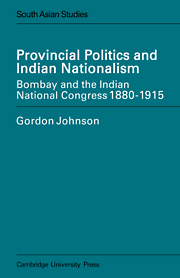Book contents
- Frontmatter
- Contents
- List of plates
- Acknowledgements
- Dedication
- Abbreviations
- Introduction
- 1 The Indian National Congress
- 2 The politics of western India in the later nineteenth century
- 3 Tilak, Gokhale and the Indian National Congress, 1895 to 1906
- 4 Tilak, Gokhale and the Indian National Congress, 1907 to 1915
- A perspective
- Note on sources
- Index
- Plate section
3 - Tilak, Gokhale and the Indian National Congress, 1895 to 1906
Published online by Cambridge University Press: 24 November 2009
- Frontmatter
- Contents
- List of plates
- Acknowledgements
- Dedication
- Abbreviations
- Introduction
- 1 The Indian National Congress
- 2 The politics of western India in the later nineteenth century
- 3 Tilak, Gokhale and the Indian National Congress, 1895 to 1906
- 4 Tilak, Gokhale and the Indian National Congress, 1907 to 1915
- A perspective
- Note on sources
- Index
- Plate section
Summary
But for an outbreak of cholera the first session of the Indian National Congress would have been held at Poona. The sitting was moved at short notice to Bombay, a city which, by comparison with Poona, led a placid political life. During the middle years of the nineteenth century its inhabitants seemed too occupied with trade, with domestic reforms, and with the municipality to bother much about national politics. It was not until 1885 that its own political club, the Bombay Presidency Association, was founded. Yet within a few years Bombay effectively took command of Congress politics in western India, and members of the Presidency Association supervised the general strategy of the whole movement.
To begin with, Poona retained its early prominence in the Congress. When it was decided in 1888 to hold a provincial conference to ‘strengthen the hands of the great National Congress’, it was the Poona Sarvajanik Sabha which called it. Bombay city ‘held herself aloof’ as Poona had not deigned to consult her prior to calling the Assembly’. Indeed, Bombay did not join the provincial conference until the fifth meeting in 1892, but then the city's dominating role became clear. Pherozeshah Mehta went to preside over the sitting in Poona. A partial observer recorded that a ‘good deal of new blood and new spirit’ was infused into the proceedings. ‘The previous Conferences were more like vestrydom. Pherozeshah … at once lifted it up from the narrow platform of parochialism to something higher and nobler and more national.’
- Type
- Chapter
- Information
- Provincial Politics and Indian NationalismBombay and the Indian National Congress 1880-1915, pp. 118 - 156Publisher: Cambridge University PressPrint publication year: 1974



